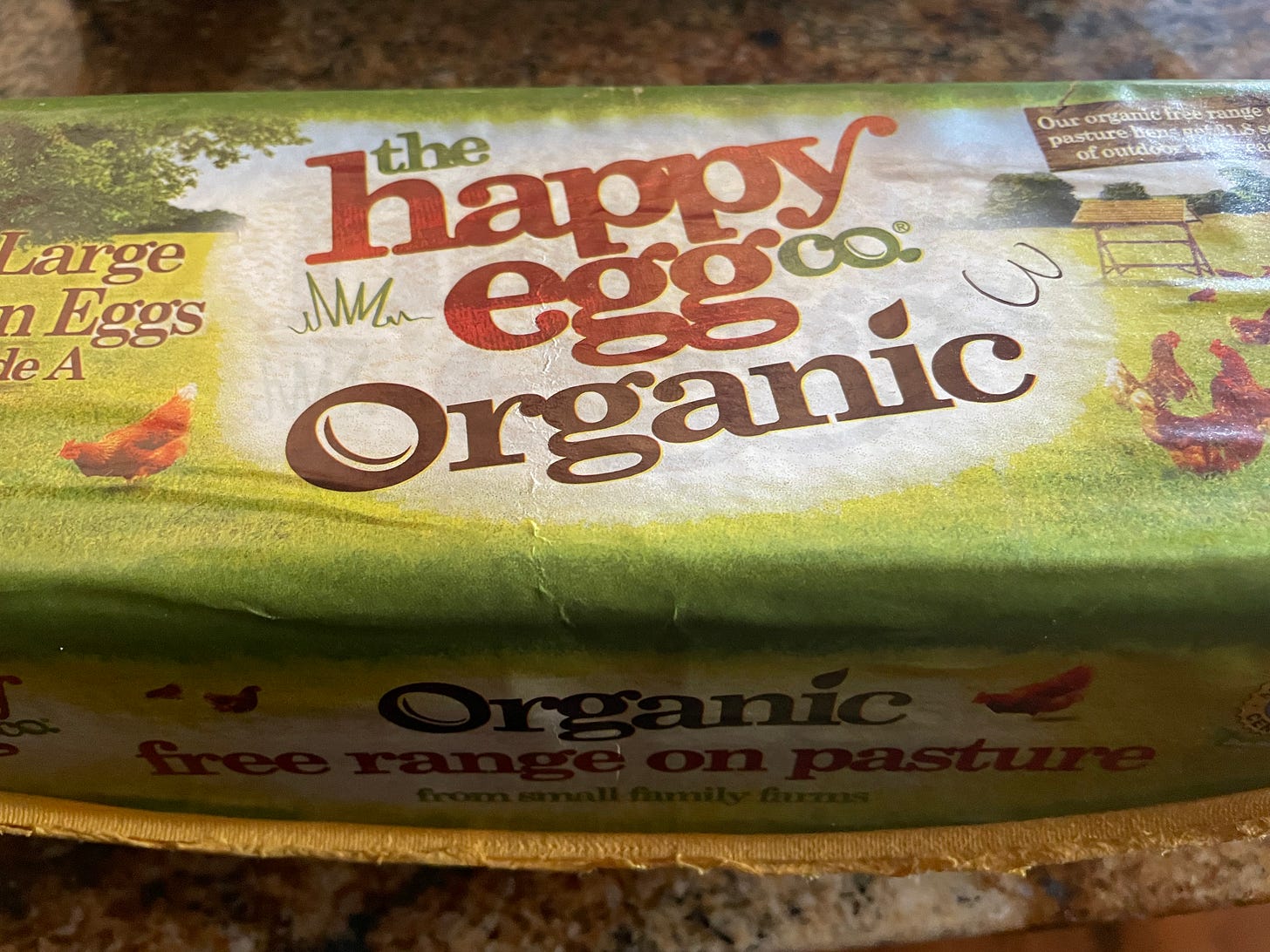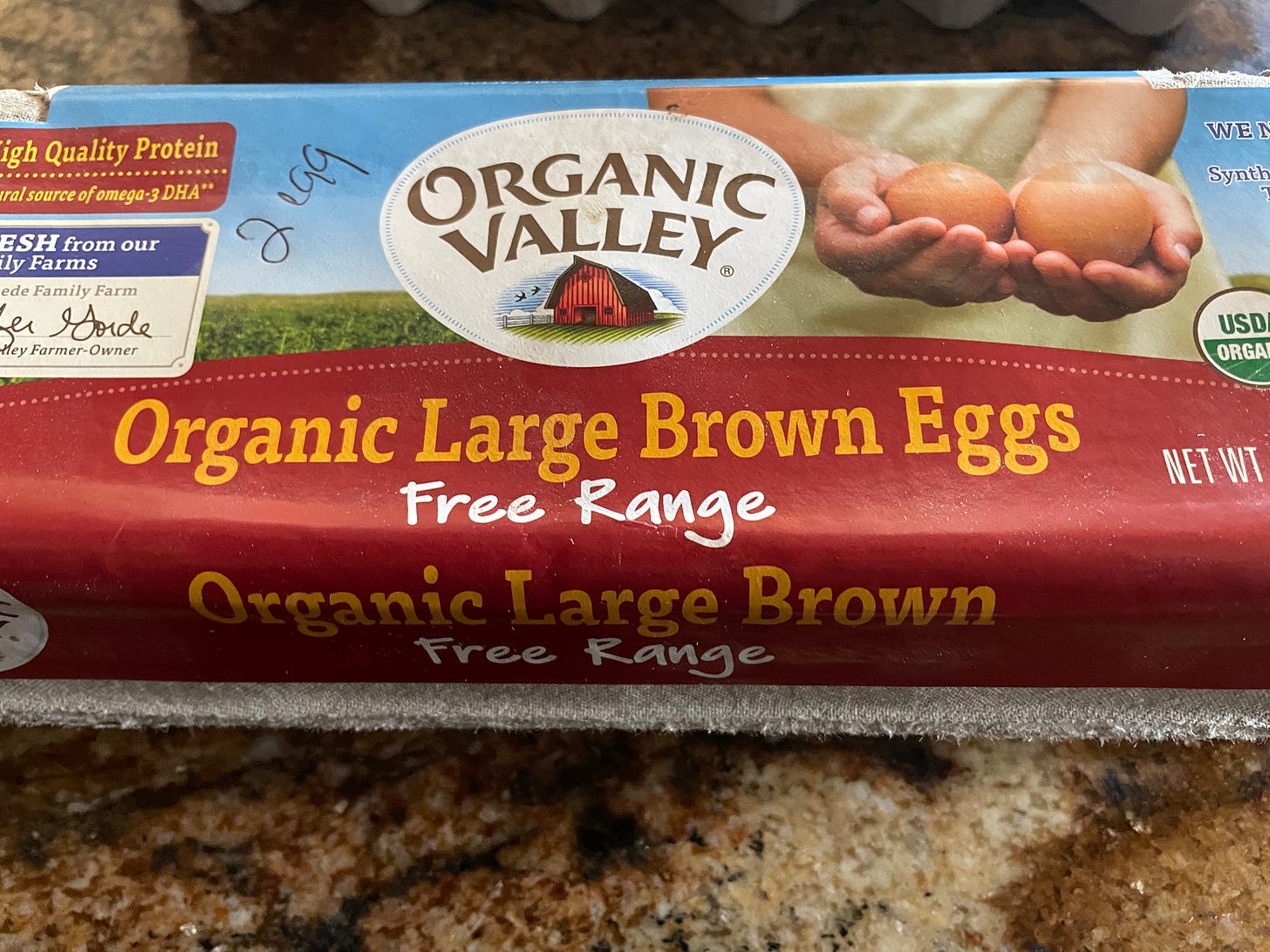Here we go again...eggs and cholesterol comment from an MD/what this doctor advised. Egg carton label confusion explained.
Avoid eggs and eat an Asian style diet? What is the difference between egg carton labels.
Eggs. Should you eat them, and how do you find the best eggs?
Should You Eat Eggs?
Eggs can be a healthy protein source, and egg yolks are rich in choline, an essential nutrient for cell membranes, metabolism, and brain health.
I was talking to someone the other day about my chickens, and he then mentioned his “high” cholesterol, avoidance of eggs, and the doctor telling him to eat an Asian-style diet, such as how they eat in Japan (rice, soy, sea vegetables, fish).
This person explained the doctor’s rationale was that when Asians move to the US, they then get diet-related health issues and cancer.
I have three questions for these medical doctors:
First, why do medical doctors give out nutrition advice without nutrition education?
Secondly, why are doctors still saying a “high” (above 200) TC is harmful or a high LDL is bad instead of running an advanced lipid panel to look at microparticle size and lipid density?
Thirdly, why on earth would a medical doctor tell a caucasian man that the Asian-style ancestral diet would be best for him?
When I tried to explain to him that eggs are not the problem and that perhaps a high TC is a problem, he looked at me and asked if I was a medical doctor. I told him I was a nutritionist but didn’t think that suited him.
If we are talking about eggs, why would you want information from a medical doctor rather than a nutritionist?
I just do not get it.
I refrained from further commenting as I do not believe in wasting my time, knowledge, or breath. Besides, I am not a medical doctor, so what do I know about food and health?
The doctor should have told him that he does not have to switch to a diet like the Japanese.
Instead, he can consume meats, vegetables, fruit, healthy fats, carbs, and proteins in the US and swap these nutritious foods for fast food, soda, and ultra-processed snack foods.
The reason that Asians have higher rates of cancer, obesity, and metabolic syndrome when they move to the US is not rocket science. Fast food, sugar, and ultra-processed foods contribute to disease. We all know that.
I believe in a culturally appropriate diet. For instance, I am a second-generation American with relatives and ancestors from Poland and Slovakia. My diet is still close to an Eastern European type. There is no reason why I should need to adopt an Asian-style diet to support my health.
Eggs are not the problem.
Total cholesterol or your LDL may also not be the problem since it is more about getting another person on a statin and not about quality of life.
I have repeatedly said this, such as when I first talked about eggs and the cholesterol myth.
To repeat myself and understand the myths surrounding cholesterol and the need for a statin, read Dr. Kendrick’s book, Doctoring Data. It is one of my favorites.
Egg Carton Labels Explained
Who knew buying eggs could be so confusing? It wasn’t when I was younger. We drove down the street to the local farm for fresh milk and eggs until we moved when I was 7 years old.
For years, I never considered cage-free, happy chicken eggs or pasture-raised chickens. When I started to realize the living conditions of most of these chickens, I wanted to raise our own. Unfortunately, where we lived at that time, we could not raise chickens, so I spent years buying the eggs that I thought were best.
The labels are confusing, and eggs are no longer a cheap staple.
Eggland’s Best May Be Deceiving You
Eggland’s Best eggs were the subject of a lawsuit for several reasons, including the claim that their eggs are of nutritional superiority. It may be disappointing if you have been buying this brand only to find out that they may have misled the public.
The Organic Consumers Association (OCA) filed the lawsuit. One reason is that the company states its eggs have fewer calories, cholesterol, and total fat. The OCA states that this is untrue and misleading, and therefore, the company is mislabeling its product to encourage more sales.
For instance, when the eggs were independently tested, they did not have the 1 fat gram as claimed but 2.84 grams of saturated fat per 50-gram serving. The chickens are also housed in cages with little room to move around, which means they are kept inside.
Here are what the labels mean to help you choose a better product
Cage-Free
Cage-free eggs mean that the chickens can roam up/down and across indoor houses. They must have access to fresh food and water, and they should have room to scratch the ground, perch, and nest.
However, these chickens still live inside, not getting fresh air and sunlight. Even though they are cage-free, there may be many of them roaming, thus creating an overcrowded environment.
Being cage-free does not equate with being happy and chicken-free in its natural habitat, but it is a step above-caged chickens, which is inhumane.
Hormone-Free
Hormone-free eggs mean that no hormones are used when raising chickens. This is purely a marketing tactic because even your caged chickens are hormone-free. Since the 1950s, all chicken eggs in the US have been hormone-free.
If the package touts this in bold lettering, avoid this marketing scam.
Certified-Organic
Certified organic eggs come from chickens that are fed organic feed and cannot eat sprayed crops. The egg carton should have the USDA-certified organic label on it.
So these chickens may be fed organic feed, which is a step up, but it is likely still corn-based. Just because they are fed organic feed does not also mean they are happy-free roaming chickens. Nope. They are probably living in crowded conditions.
A new rule requires the chickens to have a door space, whereas in the past, they just had a small concrete porch. However, this new rule does not go into effect until 2029.
Buyers should know that organic doesn’t always mean these are the best eggs.
Free-Range
The USDA regulates free-range eggs, which means that the chickens can travel up and down and across an indoor space and must have outdoor access. Free-range is a loosely defined term that sounds a lot like cage-free eggs.
Check to see if cage-free and free-range have the same price because, more than likely, one is not better than the other. Also, use the Cornucopia link below to check the specific brand.
I have been told that the outdoor space may be very difficult for the chickens to access and thus never used.
Certified Humane
Certified-humane eggs is a project via Humane Farm Animal Care (a third-party non-profit certification program), not affiliated with the USDA (which may be a good thing).
These chickens must have nesting boxes to lay eggs in, no cages, and the ability to perform their natural behavior, such as scratching and pecking.
These chickens may have less fear and stress, thus making them happier chicken eggs.
Pasture-Raised
(The egg on the top is one of our chicken eggs. The one on the bottom is a store-bought egg).
Pasture-raised chickens are raised entirely on pasture. They have the natural ability to eat bugs, worms, and grass and have plenty of space to roam and engage in dust baths.
However, the USDA does not regulate this term and has no legal definition so that it can be abused. If the carton says pasture-raised, also look to see if the carton has any certifications.
A chicken that can spend its time outside will likely produce a more golden-colored yolk. Since they can forage, they have less reliance on grain, which can make these eggs more nutritious and flavorful.
Our chickens are pasture-raised. During the day, they peck, forage, and roam our alpaca pastures. They can do their dust-bathing out there, or I use rubber farm animal feed bowls and put a blend of dirt, wood ash, and diatomaceous clay in the bowls for them to bathe in (but of the four, they all use the same dust bath bowl all the time).
They can go in and out of their coop at their leisure. They have many nesting boxes, but they all use the same one or lay in unusual spots, such as behind their food bin, in the barn behind garbage cans, or in the hay bins for the alpacas. It is truly an egg hunt daily!
An egg guide to help you choose the best eggs (that you can afford)
Cornucopia lists eggs based on the rating. The best eggs have a 5-egg score.
Scrolling through the brands, I sadly did not recognize a brand until I got to Happy Egg (3-egg score) and Organic Valley, which received a 2-egg score. The Kroger Simple Truth organic brand received a 1-egg score.
Happy Egg 3-egg score
Organic Valley a 2-egg score
Kroger, 1-egg score
Eggland’s Best received a 1-egg score from Cornucopia.
You can click on each brand at the Cornucopia link, indicating the points received in numerous categories, such as flock size, indoor spacing, hen housing, and existing areas.
Do you eat eggs?
Did you look up the brand you buy? If so, what score did it get from Cornucopia?
It is just me writing, reading, researching, and seeing clients!
I do not use mainstream social media, so please share my posts so that more people can get informed on how to get and stay healthy.
This is NOT information allopathic practitioners will share with you.









Thanks for this! Food labeling is difficult to understand in general, but egg labeling takes it to a whole new level of confusion. Very informative article!
Thank you for sorting this out. Best to optimize our health with proper information about what we're buying.
All of that said, even eating crappy eggs is better than trying to live on plants alone;-)